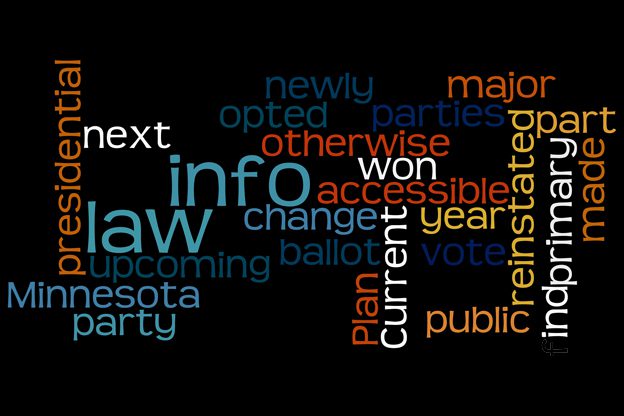

I see you’re a Democrat . . .
Something new and disturbing will happen if you want to vote in Minnesota’s presidential primary next year. You will have to disclose a party affiliation, or at least say which party’s ballot you want. The election judges in your precinct will record that information and the Secretary of State will collect these data from around the state and keep them.
Well, not only keep them, but give them to the chairs of the major political parties in Minnesota: the Republicans, the DFL, and two marijuana parties.
Plan to vote on next year’s newly reinstated Minnesota presidential primary?
The major parties will find out which party ballot you opted for, but it won’t be otherwise public info as part of upcoming law change. Current law made the info accessible to all. pic.twitter.com/TgQXfTwlWT
— Brian Bakst (@Stowydad) May 23, 2019
The memory of at least me doesn’t run to a time when you had to disclose a party affiliation to vote in a Minnesota primary election, and you still won’t for the regular primary in August. For the small sliver of you who vote in primary elections (kidding, sort of) you know that in an “ordinary” Minnesota primary that you get one ballot with the candidates from multiple parties on it and you can only vote for those in one party or another, and that if you vote for candidates from more than one party, your ballot will spoiled and not count.
But if you do it right and you are a Republican in Minneapolis, or a DFLer in Worthington, no one need be the wiser. I think that is the way it should be. I have always admired our open primary system.
The statute declares, as amended, that the party preference data for voters are private data, but that major party chairs are entitled to them.
Private? Haha. There is no limitation on what the party chair may do with these data.
Recall also that election judges are nominated by the parties. When you ask for a Republican ballot in Minneapolis, for example, some precinct functionary is going to know about it.
Once the party chairs receive the data, it is almost certain they will see that they get into the VANs (the voter activation networks) and probably transferred to the national parties’ apparatus. There is no limitation on what can be done with the information; it could be published in a newspaper if a party chair wanted.
Swell. The statute calls it “private data,” but it will be anything but private.
Say your are a public employee, a teacher or a municipal employee in rural Minnesota, without much, frankly in civil service protection, and you ask for a Democratic ballot. Or you are an employee of SEIU or a postal workers union, and you — or your spouse — requests a Republican ballot in Minneapolis.
Lotsa luck, my friends, lotsa luck.
Partisans will say that in some primaries, 2020 for example, only one party’s presidential primary will be serious contested. Hordes of people from the other party will cross over to vote for the weakest opponent! These are the same people who don’t think Bernie Sanders should run for the Democratic nomination because he “isn’t a Democrat,” even though he has caucused with them since time immemorial.
Joe Lieberman isn’t a Democrat either, but that didn’t seem to bother anybody when he ran for Vice President, although perhaps it should have, in retrospect.
[Update: Someone commented on Twitter that Joe Lieberman became an independent later; I believe that’s right, now that I think about it, but I didn’t go back to check the particulars. He did: https://en.wikipedia.org/wiki/Connecticut_for_Lieberman. But I assert that crossovers are not really a serious concern.]
If you request a Democratic ballot in the presidential primary, do you think that will make you more or less likely to field a voter challenge in the general election?
Here’s my solution. The major parties in Minnesota agree — in writing — that these data will not become part of their VANs, given to the national parties or any candidates, or published or disseminated in any way.
If agreement can’t be reached, I hope that at least Ken Martin, for himself, his party, and his heirs and assigns, agrees to never disseminate or use these data for any purpose. Put them in the drawer, shred them, burn them, subject them to powerful magnets.
Perhaps RPM Chair Carnahan could be persuaded to do the same thing.
Thanks for your feedback. If we like what you have to say, it may appear in a future post of reader reactions.

